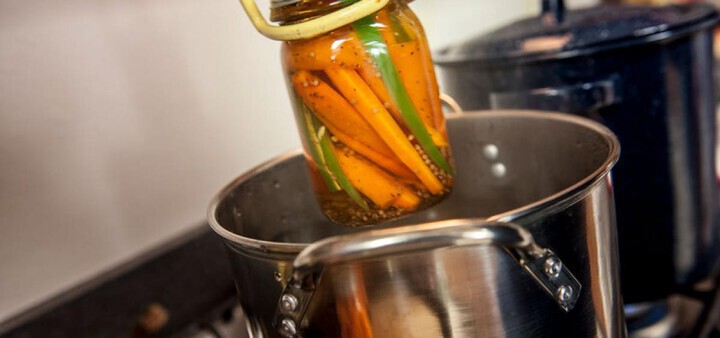CORVALLIS, Ore. – As the Oregon State University Extension Service Master Food Preserver program turns 40, its hotline is once again ready to take calls.
The toll-free hotline at 800-354-7319 runs from 9 a.m. to 4 p.m., Monday through Friday. When the hotline is closed, callers can leave a message. The hotline is staffed by certified Master Food Preserver volunteers and is available statewide.

Calls to the hotline are expected to boom during the pandemic as people discover the satisfaction of growing and preserving their own food. Already this year, food preservation questions to OSU Extension’s Ask an Expert online service have more than doubled compared to the first half of 2019. June alone saw a fourfold jump in queries, according to Teresa Crowley, who staffs the Master Food Preserver program.
Started 40 years ago in Lane County, the program has grown to include 324 Master Food Preservers, who must complete an eight-week course to be certified and start volunteer shifts on the hotline.
In 1980, Nellie Oehler, a co-coordinator and one of the founders of the program, recognized the need to provide food safety and preservation information for people putting up food, a practice that soared during the back-to-the-earth movement that started in the 1960s and ran through much of the ‘80s. As the program got started and volunteers stepped up for training, the idea of a hotline emerged and one was started in 1990.
“We were getting a lot of calls at the local Extension offices,” Oehler said. “The Extension Service has always been known for research-based food preservation information. We were getting calls from all over.”
So, the hotline was born. At first, calls were only taken in the 541-area code, but as demand grew, the program switched to an 800 number to service all of Oregon. Many people were working from iffy online sources or old family recipes, which were outdated or had safety issues.
“Old methods were popping up that weren’t safe,” Oehler said. “Our No. 1 goal was to prevent foodborne illnesses.”
At least 60% of questions have food safety implications, she said. Some could have serious consequences.
“That’s why I think it’s important to have the hotline,” Oehler said. “We do save lives.”
And now, customers at a Pacific Northwest retailer have another option for learning about food preservation. In partnership with OSU Extension, Bi-Mart has placed signage and information in food preservation aisles in the employee-owned chain’s 80 stores in Oregon, Washington and Idaho.
The Extension-designed posters and brochures provide tips on canning, freezing, smoking, pickling, drying, jerky and jams and jellies. They come complete with a QR code that, when scanned with a smartphone, takes you to OSU Extension’s Home Food Safety and Preservation website with additional information.
“Gardening, my goodness, gardening is crazy,” said Don Leber, vice president of advertising and marketing for Bi-Mart. “All these people are thinking ‘What will we do with all this food?’ We’re thinking of a lot of the newbies who may not know how to start. And now with OSU’s help, we’ve got the information. It’s a match made in heaven.”
Most commonly, hotline callers ask about preserving salsa, tomatoes and tuna. OSU Extension offers publications on each: Salsa Recipes for Canning, Canning Seafood, Canning Tomatoes and Tomato Products and Safely Canning Foods: Pressure Canners, Pressure Cookers and Electric Pressure Cookers. Search the Extension catalog for “Food Preservation” and you’ll find more publications, including some in Spanish.
Extension’s Ask an Expert, an online question-and-answer service, is another way to get information. Post a question and an expert will get back to you within 48 hours. They can offer information about anything related to food preservation from safety concerns to recipes.
There’s a free app – Canning Timer & Checklist – that provides reminders of essential steps in the canning process.